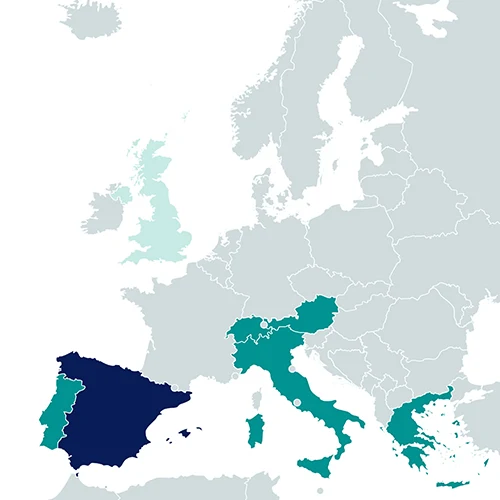2023-04-01 to 2026-03-31
Approx. 1,5 mil. EUR
Virgilio Hermoso
-
Department of Plant Biology and Ecology, University of Sevilla, Sevilla, Spain
-
Biodiversity and Natural Resources Programme – Biodiversity Ecology and Conservation Group, International Institute for Applied System Analysis, Laxenburg, Austria
-
Department of Biodiversity and Nature Conservation, Environmental Agency Austria, Vienna, Austria
-
Department of Marine Sciences, Laboratory of Marine Biodiversity and Ecosystems Management, University of the Aegean, Greece
-
Department of Integrated Marine Ecology, Zoological Station Anton Dohrn, Naples, Italy
-
Research Center in Biodiversity and Genetic Resources, BIOPOLIS, Vila do Conde, Portugal
-
Centre for Development and Environment, University of Bern, Bern, Switzerland
-
School of Science Engineering and Environment, University of Salford, Manchester, United Kingdom

The EU has created substantial legislation, policies and strategies for biodiversity conservation over the last decades. However, the efforts implemented by its Member States have proven insufficient for halting biodiversity loss at a continental scale, as only a small proportion of species and habitats listed in the Birds and Habitats Directives are under no foreseeable risk of extinction. The EU Biodiversity Strategy for 2030 aims at addressing issues of insufficient advance towards halting biodiversity loss, such as the lack of planning at adequate scales when designing the network of protected areas or the poor integration of conservation across diverse sectoral policies.
INSPIRE aims to develop a novel decision-support framework for prioritising management efforts across terrestrial, freshwater and marine realms while accounting for trade-offs in multifunctional land- and sea-scape use and changing environmental conditions. INSPIRE further aims to integrate biodiversity conservation into key socioeconomic activities, to reconcile conservation and the sustainable use of biodiversity and ecosystem services, accounting for synergies and potential trade-offs among the multiplicity of objectives pursued. In this way, INSPIRE aims to contribute towards defining coherent and well-connected networks of areas for biodiversity management, seeking for biodiversity conservation opportunities also beyond protected areas. Finally, INSPIRE aims to address biodiversity conservation under dynamic conditions, exploring proactive planning strategies towards a more resilient biodiversity conservation practice.
INSPIRE will use three case studies to demonstrate how to improve decision-making under different objectives and constraints: The Aegean Sea and its catchments (Greece-Türkiye), the Tagus River catchment, estuary, and nearby marine area (Portugal-Spain) and the Neusiedl Lake and its contributing catchments (Austria-Hungary). Building on principles of ecology, spatial planning and economics, INSPIRE will identify relevant management objectives (e.g., biodiversity conservation along with other human activities such as agriculture, energy production or fisheries), mobilise existing data to calibrate spatial models, and identify spatial priorities to achieve the objectives by the implementation of multi-objective optimisation mathematical models.
Through early and regular engagement with national and international policy makers and stakeholders in a transdisciplinary approach, INSPIRE will foster co-generation of knowledge and capacity building to ensure that both the framework and results from the project are fit for purpose and informative for decision making in the context of the Biodiversity Strategy for 2030. This will be done through early workshops to foster co-generation, and communication of the results at the levels of EU-National governments and case study stakeholders. Finally, INSPIRE also plans to reach out to the general public to raise awareness on conservation problems across terrestrial, freshwater, and marine ecosystems and the use of spatial planning approaches to guide management.